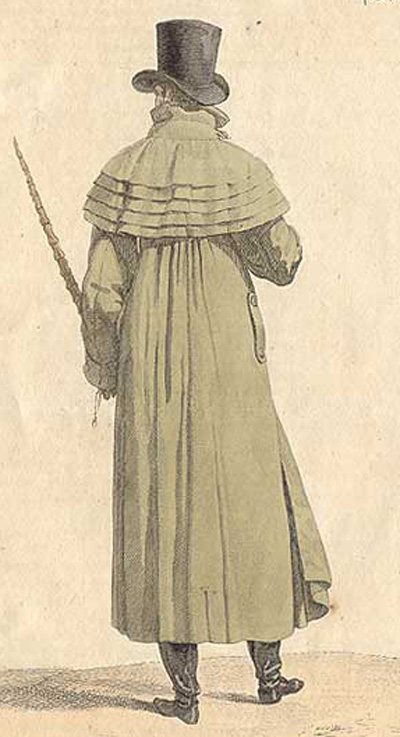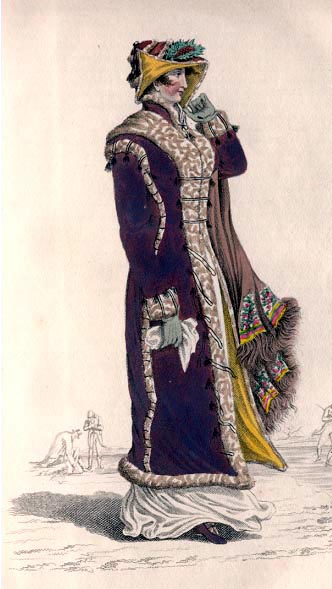I wrote the original of this blog post six years ago, almost to the day. Even though today it reached near 60 degrees F in Northern Virginia, last week we were in the teens and the midwest had reached record lows. So this blog post seemed very apropos! Here it is (with minor editing):
We’ve just been through a very cold patch of winter here in Northern Virginia, with snow and ice and below freezing temperatures. Parts of the US had been seeing even worse. So bundling up and keeping warm have been on my mind these days.
I searched “winter” on the Regency Encyclopedia, and came up with What To Wear In Winter in The Regency.
From A Lady of Distinction – Regency Etiquette, the Mirror of Graces (1811)
R.L. Shep Publications (1997)
Satin, Genoa velvet, Indian silks and kerseymere may all be fashioned into as becoming an apparel for the slender figure as for the more en bon point and the warmth they afford is highly needful to preserve health during the cold and damps of winter.
The mantle or cottage-cloak should never be worn by females exceeding a moderate en bon point and we should recommend their winter garbs to be formed of double sarsenet or fine Merina cloth, rather than velvets, which (except black) give an appearance of increased size to the wearer.
Red Morocco, scarlet, and those very vivid hues cannot be worn with any propriety until winter, when the color of the mantle or pelisse may sanction its fullness.
I love the emphasis on looking slim! Some things never change. And look how similar the colors are to what we wear in winter. I love the rich deep colors of winter clothing.
From Buck, Anne M. – Contrib to The Regency Era 1810-1830
The Connoisseur Period Guide (1958)
White muslin was for the whole period pre-eminent for morning wear. Only in the months of mid-winter did the hardy Englishwoman abandon it for silk, poplin or wool.
Nothing sets the dress of 1800-20 so much apart from the style before and the style which followed as the scarcity of the underwear beneath it. A chemise of linen, long, reaching well below the knee; light flexible stays; a petticoat, cotton in warm weather, fine flannel in winter; and then the gown or slip. Many of the muslin gowns were worn over a silk slip.
Straw bonnets were worn during the summer months for walking, Leghorn or fine Dunstable straw, usually plainly trimmed. Fashionable for all the summers of 1815-30, they remained comparatively plain even in the years of excessive trimming. In winter black velvet replaced them.
Black velvet hats sound divine! And note how the lady was supposed to wear as little underwear as possible! Hearty Englishwoman, indeed!
From Cunnington, C. Willett – English Women’s Clothing in the Nineteenth Century
Dover reprint of 1937 original (1990)
The summer pelisse was unlined, the winter pelisse was lined.
And more on undergarments by Cunnington, C. Willett & Phillis – The History of Underclothes Dover (1992)
The petticoat was made of cotton, cambric, linen or for winter, sometimes fine flannel.
The idea of “fine flannel” underwear sounds lovely on a cold, damp day!
De Courtais, Georgine – Women’s Hats, Headdresses and Hairstyles
Dover Publications (2006) says
In winter caps and hats (1800-1810) were often trimmed with fur to match similar edging on robes and coats, but a wide range of materials was used both for the hats and for their trimmings.
I love the fur trimmings. Now we can do this in faux fur and still be animal-friendly! And washable!

And for the gentleman, from Kelly, Ian – Beau Brummell, The Ultimate Man of Style
Free Press (2006)
Brummell also ordered surtouts or greatcoats from Schweitzer and Davidson for winter wear. They were significantly heavier garments, so much so that they were noted in the weighing books at (wine merchants) Berry Brothers. Made out of even heavier worsteds and “Norwich stuff” – another feltlike beaten wool – they were still exquisitely cut and molded.
Yum!!!
What is your favorite winter garment?
I like the wool scarf and plaid gloves I bought in Scotland while on Number One London’s Scottish Retreat.

